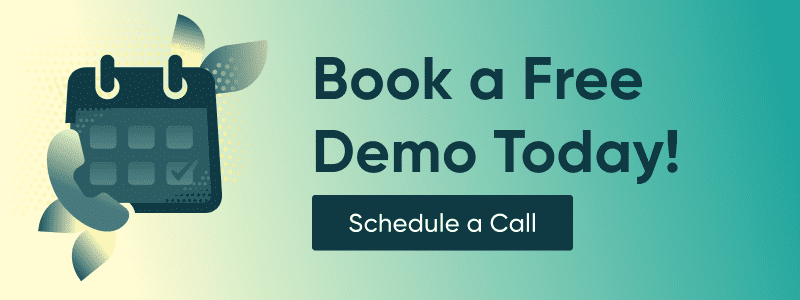Best Compliance Software: Our Top 9 Picks for 2024
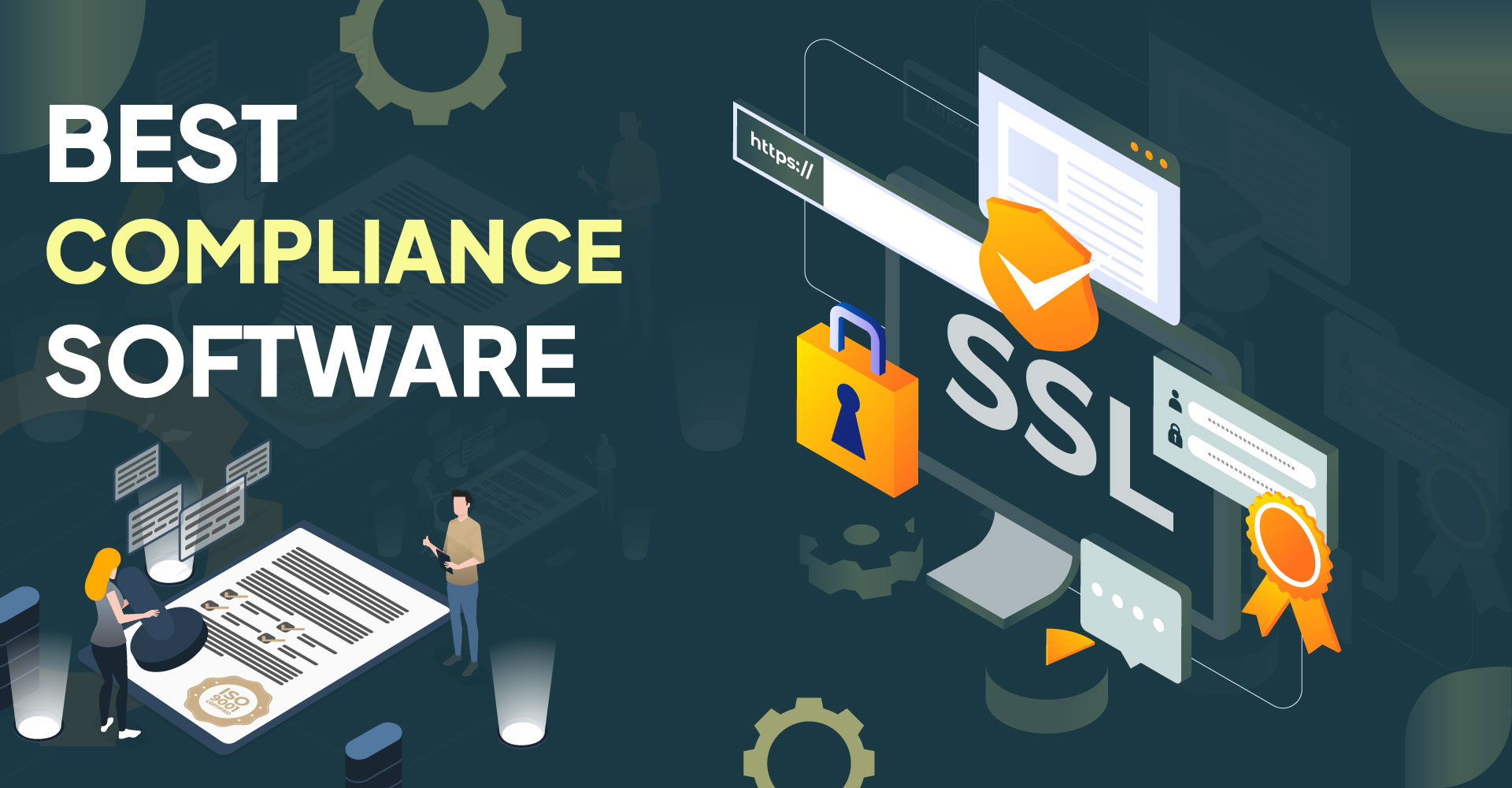
Table of Contents
The Best Regulatory Compliance Software
The key regulatory challenges of 2024 include both new legislation and strong supervisory frameworks for existing guidance, according to a new KPMG report.
This advice extends to a host of new verticals as groundbreaking laws like the EU's A.I. Act start to come into force and regulators continue to closely examine data security, management, and privacy best practices.
In 2023, data privacy frameworks such as Quebec Law 25 and the India Data Protection Act placed new restrictions on businesses. It is expected that we'll witness rigid enforcement of these laws in 2024, with organizations having plenty of advance notice on reformulating internal processes to meet the updated requirements.
A good compliance software solution simplifies processes, automates tasks, and centralizes data to make compliance easier to manage. With real-time updates and customizable features, these platforms help businesses stay agile as regulations change. This reduces risks and ensures long-term success in a complex regulatory landscape.
This article reviews the best compliance software that keeps your business on track by automating many core compliance requirements.
What Does Compliance Software Cover?
Compliance is relevant in specific circumstances related to the storage of data. The word “compliance” means conformance with a set of data management standards. In almost all cases, these standards relate to personally identifiable information (PII). This term means data that can identify a specific person.
The first PII protection system that was created was the General Data Protection Regulations (GDPR), which was published by the European Union in 2016 and came into effect in 2018. GDPR is not an enforceable law. Instead, it is a set of rules regarding data management that were implemented in national law in each of the member states of the EU. Thus, as the United Kingdom was a member of the EU in 2016, it implemented the regulations on its own statute book and so the law continues to be in force in that country.
What Does Compliance Require?
The term “compliance” just means keeping within the law with respect to data management. For GDPR, data must be:
- Held securely
- Only accessed for appropriate use
- Not accessed for secondary purposes
- Gathered with consent
- Protected from disclosure
- Kept accurate
- Held, processed, and viewed within the EU
The person that a record is about is called the “data subject” and that person has the right to see the information and correct any errors. The mechanism for access is called a “data subject access request” (DSAR). No one has the right to see data about other people unless that requestor has been authorized by the data subject. No one has the right to demand that their PII is deleted.
Implementing compliance
In order to protect data, control access to it, and locate it in response to a DSAR, the data manager needs to know where the sensitive data is held. The search around all data stores for sensitive data is called eDiscovery. As well as finding data stores, the contents need to be categorized, so that the compliance software can tell which standard the instance relates to. The recording of these locations is called “data mapping.” The store of those locations is called a data inventory.
Quebec Law 25
Many other laws for data protection have been developed since GDPR and they are all imitations of the EU’s set of rules, covering roughly the same requirements. One of the latest is Quebec Law 25.
Law 25 applies in the Canadian Procide of Quebec as well as on businesses that processed the data of its residents. The government of the French-speaking province passed this law in September 2021 and it is actually called The Privacy Legislation Modernization Act. The requirements of the act are being phased in over a three-year period, starting in September 2022.
Features of the law include:
- Companies must designate a Data Privacy Officer – this person doesn’t have to be a qualified specialist or dedicated to data privacy full time.
- Businesses must include a Privacy Impact Assessment (PIA) when introducing or updating an IT system.
- Any data breaches should be notified to Le Commission d’accès à l’information du Quebec and also to all of the people whose data was involved.
- Members of the public should be informed by privacy notices at the point that data is collected. This should specify the purpose of the data storage and companies should not use that data for any other purpose.
- DSAR management, which is similar to the requirements of GDPR. An important difference is that the data subject has the right to demand that data is removed. A response to a DSAR must be implemented within 30 days.
Failure to comply with Law 25 can incur a fine of between $15,000 to $25,000,000. That upper limit can be increased to 4 percent of the company’s worldwide turnover (not profit) if that percentage is greater than $25,000,000.
The law applies to any business that operates in Quebec, regardless of where they are headquartered. There are only two requirements that have to be implemented by filing notifications. These are a form that records the appointment of a Data Privacy Officer and a notification that the company intends to use biometric measures for user identification. Both of these forms have to be submitted to Le Commission d’accès à l’information du Quebec.
All of the other requirements of the law are expected to be implemented by companies autonomously without having to submit proof on a regular basis. Instead, companies should be prepared for an ad-hoc audit by the commission and they should also accumulate proof of security measures to present in the event of a breach.
A data breach does not necessarily incur a fine if the company can show that it has taken all reasonable measures to protect data. Legislators realize that no company can be expected to predict every new attack method that could be thought up by hackers for the rest of time – that would be a standard that no organization could meet.
Data Breach Management & The Threat of Litigation
The toughest and most stringent data privacy laws (GDPR, Law 25, and CCPA) all have specific requirements around data breach management. Companies that suspect they've been hit by a data breach must promptly inform both regulators and their customers about this possibility and a failure to do so puts them in direct violation of compliance requirements.
In other cases, some companies may also stress test their vendors and third-parties for compliance purposes since that can be an indirect method for malicious entities to attack. Either way, the best compliance tools will assist with data breach notifications, data mapping, data governance, privacy impact assessments, and more to satisfy regulatory, governance, and risk concerns.
Let's dive into our top picks:
1. Enzuzo
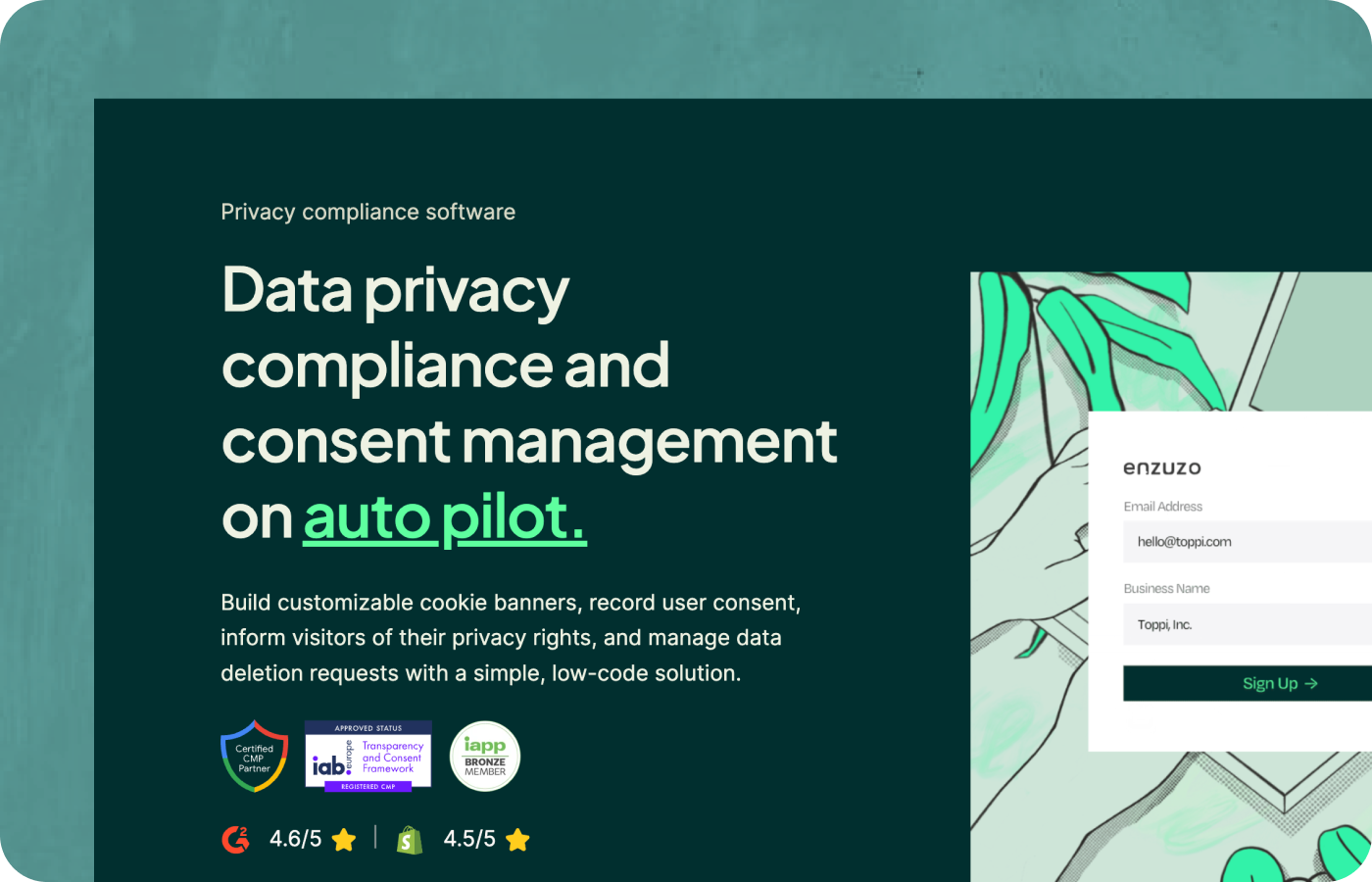
Enzuzo offers a global automated legal and regulatory compliance management solution to help businesses meet exacting standards for:
- General Data Protection Regulation (GDPR)
- California Consumer Privacy Act (CCPA)
- Brazil’s General Data Protection Law (LGPD)
- Quebec Law 25
Its most recent update is a solid cookie consent management tool that applies the appropriate cookie consent banner text according to the visitor’s location. The package includes consent analytics and log creation for compliance auditing.
Advanced Compliance Features for Enterprise Clients
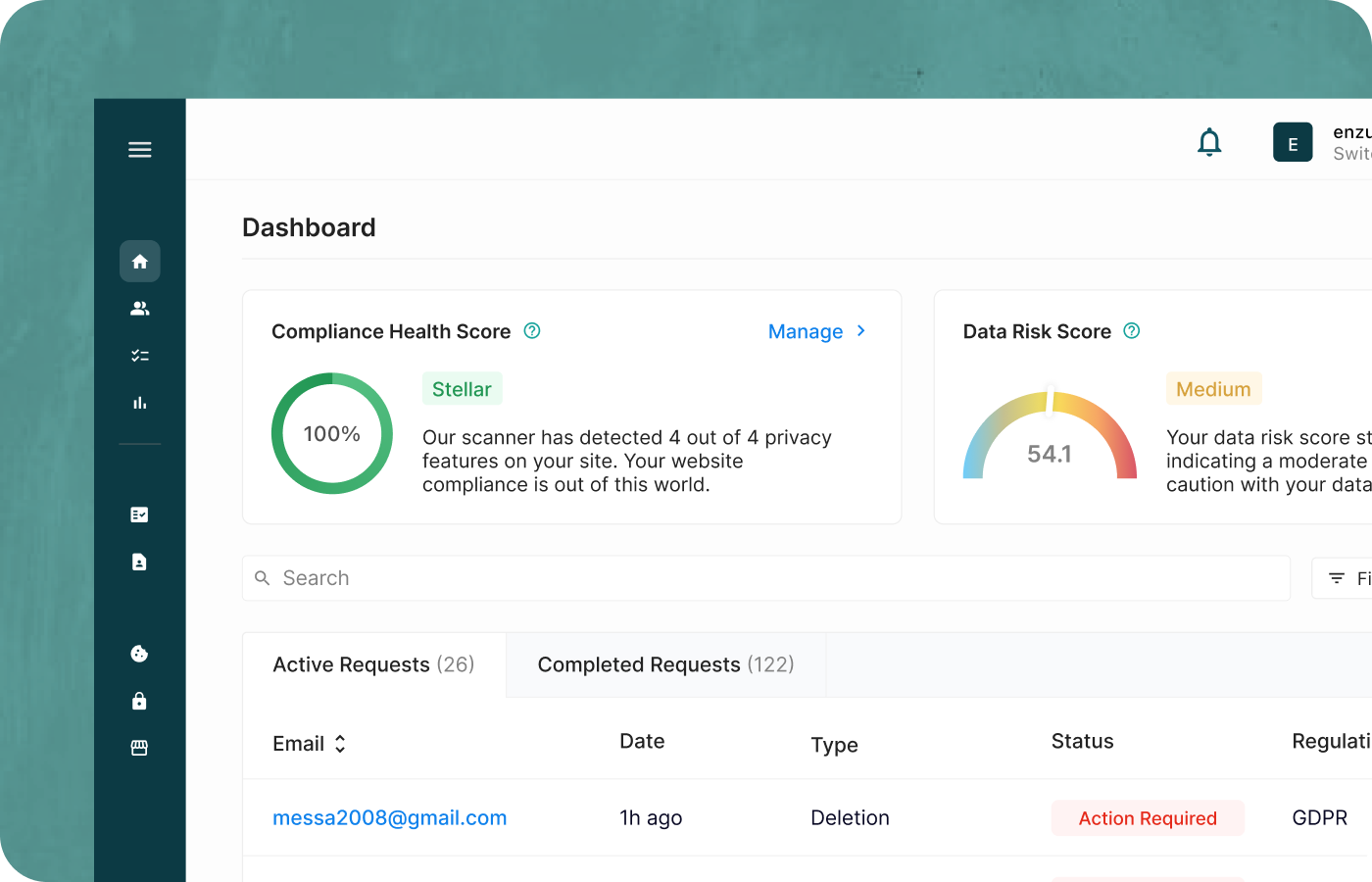
Enzuzo’s enterprise plan expands on cookie consent management to provide a full data privacy standards compliance package. The key features of the plan are:
- Do Not Sell My Information workflows to comply with GDPR & CCPA
- Data governance and data mapping workflows to meet GDPR requirements
- Cookie consent management and analytics
- International data transfer assessments and compliance with GDPR article 30
- Record of processing activities
- Core legal policies such as terms of service and privacy policy generators
The enterprise plan is competitively priced compared to the rest of the industry and allows for custom workflows and solutions
.
👉 Read Why Global Conglomerate Lucy Group Picked Enzuzo As Its Data Privacy Partner [Case Study]
Region-Specific Cookie Consent Management
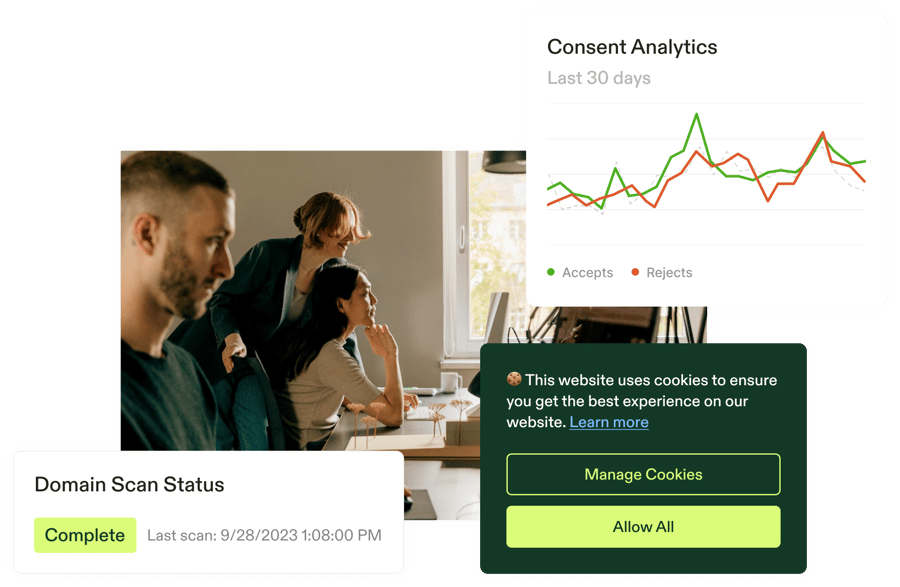
Emerging privacy laws like Quebec Law 25 and older compliance regulations like GDPR & CCPA mandate that businesses must clearly allow customers to opt out of data tracking via cookie consent.
Businesses must also distinguish between necessary cookies and those used for advertising or statistical analysis. Enzuzo’s cookie consent manager helps you configure your cookie notice to match your brand and set it up to show for specific regions.
Enzuzo does not meter Web traffic – plans are charged at a fixed rate per month and not according to throughput. Enzuzo doesn’t impose hidden charges or overage rages like some providers in the Compliance Management field.
No-Code Platform Set up in Minutes
Enzuzo is easy to set up and install quickly. Embedding standard compliance workflows and legal pages onto your website requires the insertion of a few lines of Javascript. Task guides enable the new system to become operational without the need to activate special integrations. You won’t need any programming skills to implement these changes.
Joya J posted a review on G2 that testifies to the ease of implementing Enzuzo’s cookie consent system:
Knowledgeable and Responsive Customer Support
Enzuzo caters to all sizes of businesses and that includes owner-managed small enterprises and startups. The company realizes that this category of customer requires expert advice, especially during onboarding. So, Enzuzo’s Customer Support team are always available for advice and to troubleshoot issues. This is a team of technicians, not a call center.
This reviewer is typical of the small business customers who got a quick and accurate solution from the Enzuzo Help Desk:
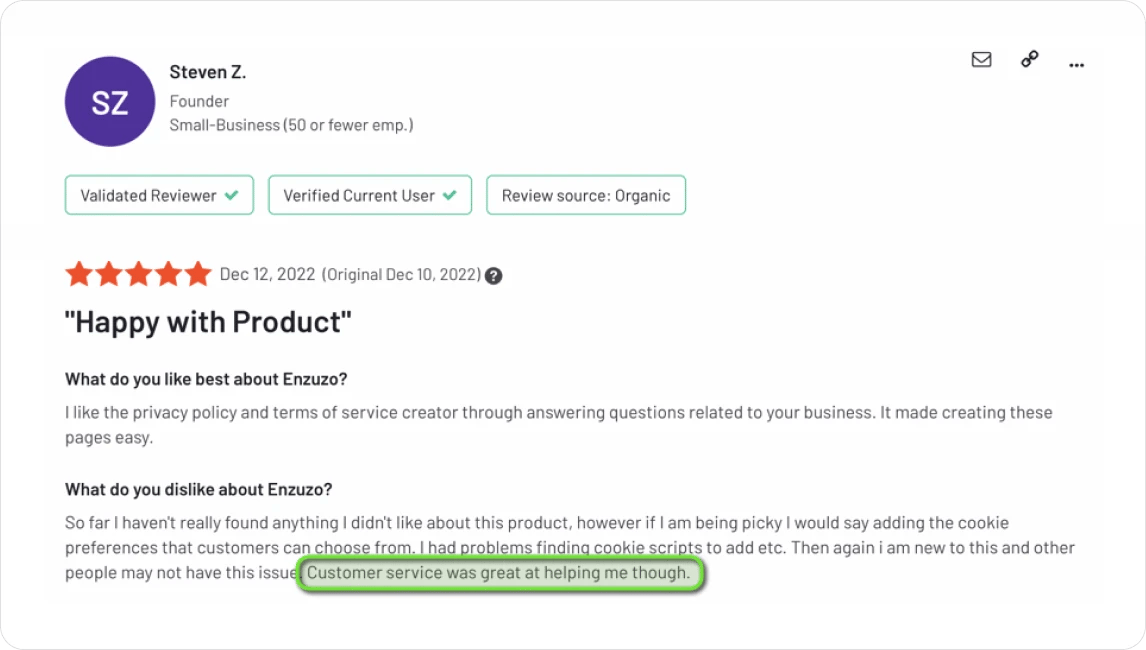
Custom Workflows and Features
Enzuzo will produce new workflows to meet the needs of customers who find that their compliance requirements aren’t fully met by the current system. For example, a current feature in development will provide the ability to display a unique cookie banner depending on the customer type and location. This will enable the client to configure each cookie banner separately and dynamically choose which one to display.
In another case, Enzuzo worked with a client to integrate the policies directly into its website that was built on an application framework. Enzuzo's solution allowed all legal policy language to update when the website's language changed.
Affordable Pricing
Data privacy compliance software doesn’t need to come with an exorbitant price tag. Many of the tools in this review require long-term contracts with prices reaching tens of thousands of dollars.
Enzuzo plans are different. They offer flexible month-to-month arrangements for cookie consent and compliance services. Customers can cancel anytime. Furthermore, the pricing plans are both competitive and affordable.
Pros and Cons
Enzuzo Pros:
- Comprehensive solutions for cookie management, consent collection, and policy generation
- Tiered pricing options with a Free edition available
- Quick onboarding backed by reliable customer support
Enzuzo Cons:
- Basic plans will not be comprehensive enough for larger organizations
Suitability
Enzuzo is suitable for all sizes of businesses. Its consent management solution compares favourably with competitors such as OneTrust, offering the same features at a cheaper price. It is also a good choice for companies that manage multiple domains, including service providers. Pricing scales well as your requirements increase, with no hidden surprises on the monthly bill.
The advanced features of Enzuzo’s Enterprise Edition include data governance, data mapping services, privacy impact assessments, RoPA procedures, and third-party risk assessments. Enzuzo offers white glove onboarding assistance to ensure a smooth onboarding process.
Overall Thoughts
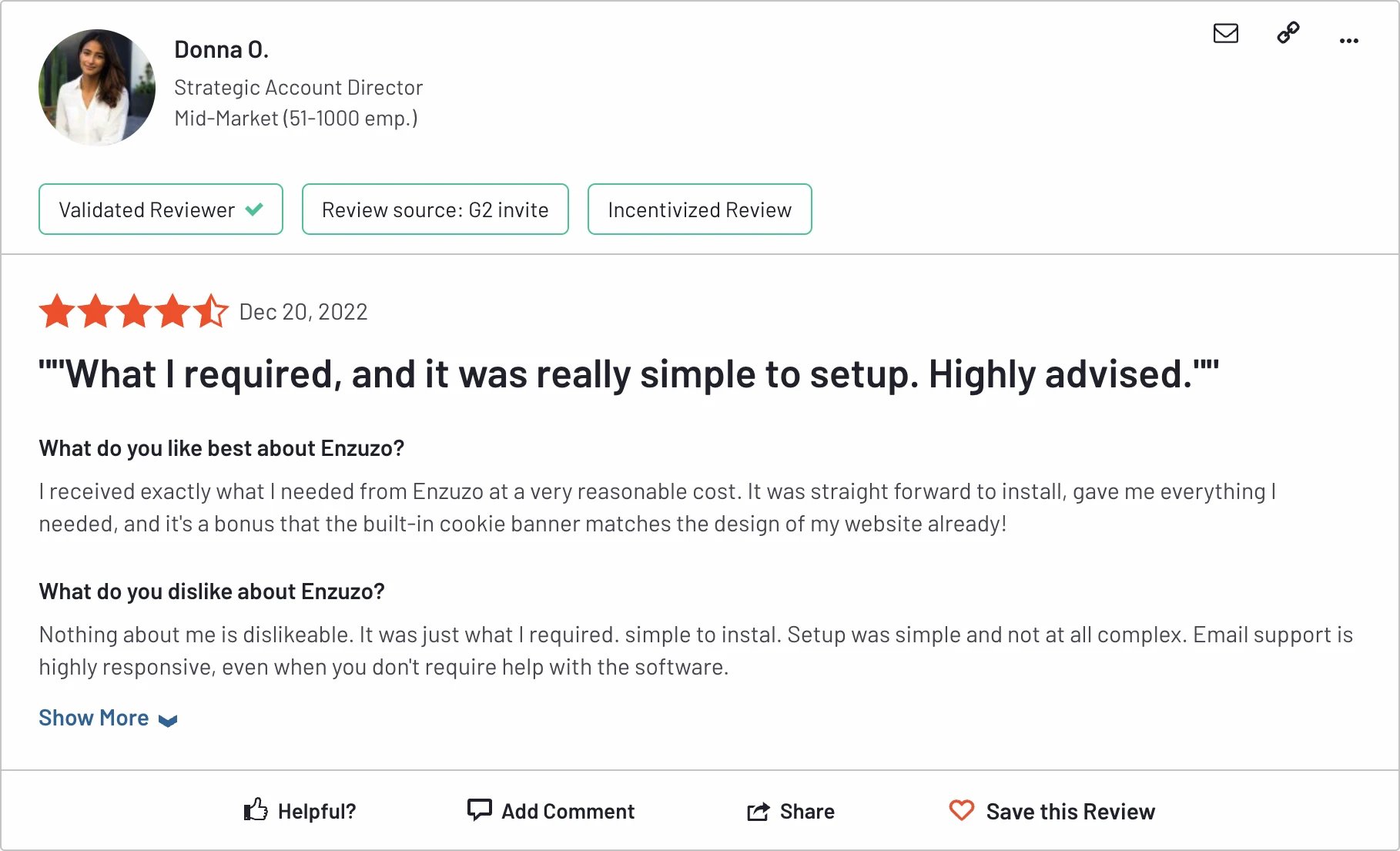
Enzuzo is one of the most straightforward and user-friendly platforms for compliance management on the market. With multiple plans and a development team committed to its clients from pre-purchase research to customer support, Enzuzo has something for everyone, making it our top compliance software candidate.
Learn more about how Enzuzo can assist your compliance program. Book a no-obligation strategy call with a product expert 👇
2. OneTrust
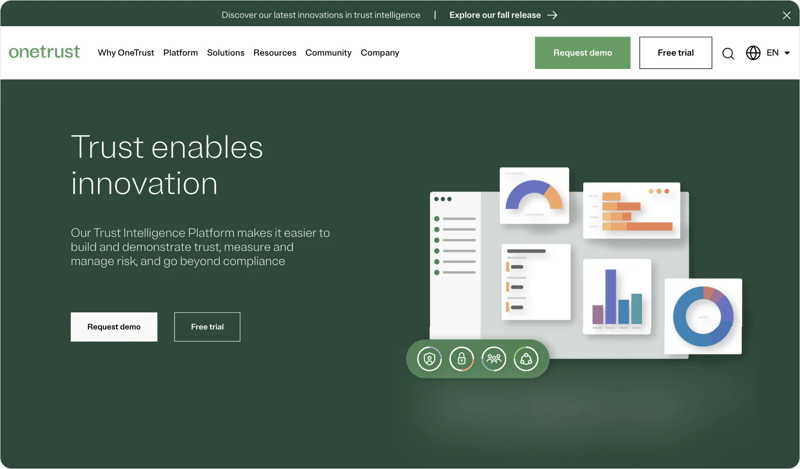
OneTrust stands out as an industry leader. It offers a comprehensive range of features that enhance an organization's compliance, transparency, and resilience. Unlike many data privacy software options, OneTrust consistently demonstrates its value to users through extensive customization options and seamless integration capabilities:
- Privacy and data governance
- Governance, risk, and compliance assurance
- Environmental, social, and governance management
- Ethics and compliance
Founded in 2016, OneTrust emerged in response to the evolving data privacy landscape. The catalyst for its inception was the transformative impact of regulations such as GDPR, which became enforceable in 2018. OneTrust’s founders witnessed the profound changes in privacy regulations and envisioned a solution to simplify compliance for businesses.
While OneTrust undoubtedly offers a plethora of compliance features, it ships with a hefty price tag, long contracts, and frustrating implementation problems. Many reviewers have pointed to how customer support is unresponsive, and that the platform isn't worth the money you pay. Nonetheless, if you have lots of money to spend, OneTrust is a good option for your regulatory compliance needs.
Top Features
OneTrust was conceived as a comprehensive platform offering essential tools, including data mapping, data request management, consent management, website compliance, privacy impact assessments, and more.
This extensive toolkit was designed to empower organizations in their compliance endeavours. Over time, OneTrust's commitment to excellence and its robust suite of privacy management tools propelled the company to a prominent position as a market leader in the field of privacy management.
Pros and Cons
OneTrust Pros:
- Comprehensive feature set for a variety of uses
- Excellent for enterprise and corporate buyers
- Strong integration potential with other business intelligence platforms
OneTrust Cons:
- Long-term contracts with prohibitively expensive pricing
- Unresponsive customer support
- Complex platform that is difficult to set up and integrate
Suitability
OneTrust is a versatile privacy management platform suitable for larger enterprises and industries with strict regulations, thanks to its comprehensive features and global support. However, its high cost and complexity may make it less suitable for smaller organizations.
Note that OneTrust requires lengthy contract commitments from its customers, which may further reduce its viability as an all-purpose platform. Companies will need to consider their growth goals before purchasing SaaS solutions with these extensive commitments.
Overall Thoughts
OneTrust is an excellent choice for businesses that want to engage in the onboarding process fully. Note that the typical contract values associated with OneTrust can exceed $50,000, and the long-term implementation expenses can run into the hundreds of thousands. Therefore, every enterprise should thoroughly evaluate its compliance requirements when contemplating a long-term partnership with OneTrust.
👉 Considering your options? Check out our blog on the best OneTrust alternatives
3. BigID
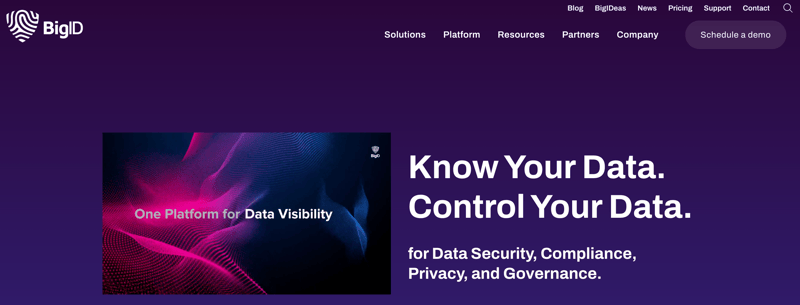
BigID stands at the forefront of the data security, privacy, compliance, and governance arena. It empowers organizations to discover, manage, safeguard, and extract enhanced value from their data. This all-encompassing platform delivers comprehensive data visibility and control and serves as a singular solution for these critical aspects.
Founded in 2016, BigID has been recognized by CNBC as one of the top 25 startups for the enterprise in 2022. It has been named to the Inc 5000 and Deloitte 500 for two years in a row and is one of the leading data security vendors in the market today.
Top Features
BigID’s flagship offering is its data intelligence platform that provides “infinite possibility” through one single system. Some of these top features include integrated solutions for governance, security, a compliance cloud, and tools for data lifecycle management. The company serves a variety of industries across federal, finance, healthcare, and retail and offers data security solutions across a wide range of uses.
BigID also offers bundled service packages to further uplevel a customer’s abilities, including Zero Trust, Data Rights Automation, and Insider Risk Management.
Pros and Cons
BigID Pros:
- Robust data discovery tools for visibility and categorization
- Affordable for its size
- Free trial available
BigID Cons:
- Some features may be complex and cumbersome to use
- No API key
- Pricing is not transparent
Suitability
BigID offers a comprehensive toolkit that enterprise users love. The platform is user-friendly for its size, though challenges persist. Users report that BigID’s features are more suited to big-picture analyses rather than in-depth file reviews, which produces cumbersome workflows for a platform this size.
In terms of costs, pricing for BigID is complex and dependent on each company’s ecosystem, which makes it difficult to perform true cost comparisons with its competitors. However, users suggest that BigID is affordable for its enterprise feature set so mid-sized companies may find value in a free platform trial.
Overall Thoughts
BigID boasts a powerful suite of tools backed by a user-friendly interface and affordable price point. However, note that the platform does not have an API key, so its integration potential may be limited compared to competitors. Nevertheless, users in most industries will find something to love with BigID, provided they can look past the cumbersome architecture and broad scope of services.
4. Ketch
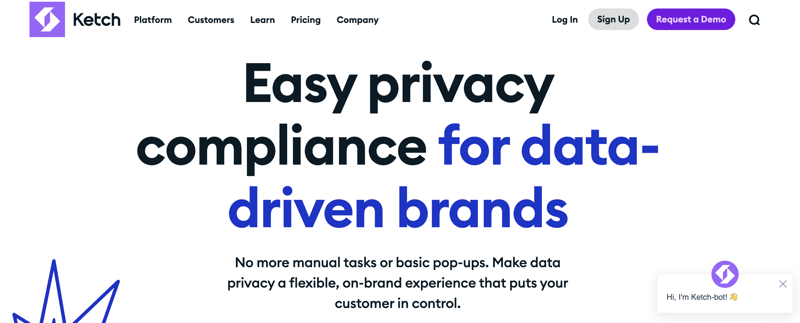
Ketch's capabilities encompass a broad spectrum of data governance needs. Like other providers, Ketch understands that bringing visibility to every customer’s data footprint is a fundamental step in data governance. To facilitate this goal, they provide comprehensive insights into data usage and storage practices and offer solutions for consent management, risk assessments, DSRs, communication preferences, and more.
Founded in 2020, Ketch is one of the youngest entries in our list but represents another viable entry for businesses seeking more automated, programmatic ways to address their compliance goals.
Top Features
Ketch simplifies compliance with dedicated solutions for data mapping and discovery, consent management, risk analyses, DSR requests, and AI-based governance. To help companies stay updated with evolving data privacy and AI laws, the company offers several plans, including Ketch Free for day-one privacy compliance and the more advanced Ketch Programmatic Privacy for adaptable, cost-effective compliance solutions.
With cross-device identity management for a consistent consumer experience and custom APIs for seamless integration with third-party systems, Ketch promises that privacy choices are upheld throughout an organization's data ecosystem, including AI models. This comprehensive approach helps businesses build trust with their customers while navigating the complexities of modern data regulations.
Pros and Cons
Ketch Pros:
- Many advanced features and tools
- Custom APIs available
- Free option available
Ketch Cons:
- Expensive plans
- Long contracts required
- Less mature product roadmap
Suitability
Ketch is suitable for larger organizations at the enterprise level. Although Ketch does offer a free version that small businesses can use, these basic functions will take them only so far. The true force behind Ketch’s value proposition is its programmatic privacy solutions that leverage AI and automation.
These features are available only in Ketch’s Enterprise plan—a high-cost option with contractual obligations. This investment may be out of reach for smaller businesses, though Ketch Free can offer a good starting point for cookie management and subject rights intake.
Overall Thoughts
For being such a new entry in the compliance game, Ketch has some impressive features to back it up, and enterprise users will surely find value in its AI-based approach to data privacy, which allows for agile adaptation to fast-changing privacy and AI regulations. These features help larger businesses manage compliance at scale and reduce operational and privacy engineering costs.
5. TrustArc
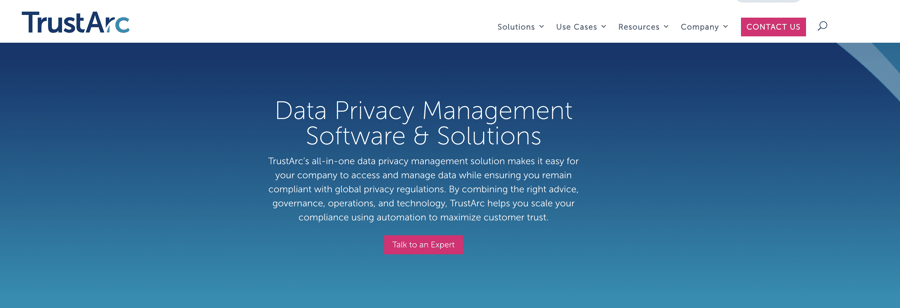
TrustArc specializes in solutions and services related to data privacy compliance.
It was originally known as TRUSTe when it was founded in 1997, but it rebranded to TrustArc in 2017. It also offers a privacy certification, which is often showcased on online storefronts to establish trust with consumers.
Top Features
TrustArc excels at consent tools that assist businesses in navigating the evolving landscape of global privacy regulations. To ensure that companies remain up to speed, TrustArc offers three service plans for privacy management: Cookie Consent Basic, Cookie Consent Professional, and Cookie Consent Advanced.
On top of that, TrustArc offers solutions for continuous privacy management that include strategic guidance, regulatory compliance, and simplifying the intricate aspects of day-to-day privacy management. Add in various other managed support services, and TrustArc can be a viable all-in-one management solution.
Pros and Cons
Pros of TrustArc:
- Comprehensive platform for compliance, cookie management, and privacy
- Good reporting tools and transparency into operations
- Strong library of supplementary compliance and privacy resources
Cons of TrustArc:
- Expensive plans
- Subpar customer support for problems
- Users report a UX that frustrates and challenges them
Suitability
TrustArc’s preset plans are a convenient feature that simplifies the decision-making process for business owners and allows them to determine whether TrustArc is a suitable option. Moreover, the ability to readily compare plans and the flexibility to adjust or cancel on a month-to-month basis offers a more convenient experience for buyers.
But note that TrustArc's Basic plan is quite limited and can fall short of providing adequate coverage for companies with extensive privacy regulations. Furthermore, the less-than-ideal UX and subpar customer support may discourage certain business owners.
Overall Thoughts
TrustArc is a dependable option for businesses that want a straightforward compliance solution without excessive add-ons. It's especially well suited for companies that can handle operations internally and rely less on external customer support. Buyers may find the basic plans too limited, while the more expensive options may be untenable for smaller budgets—so companies will need to do careful comparisons to ensure a right fit.
6. Usercentrics
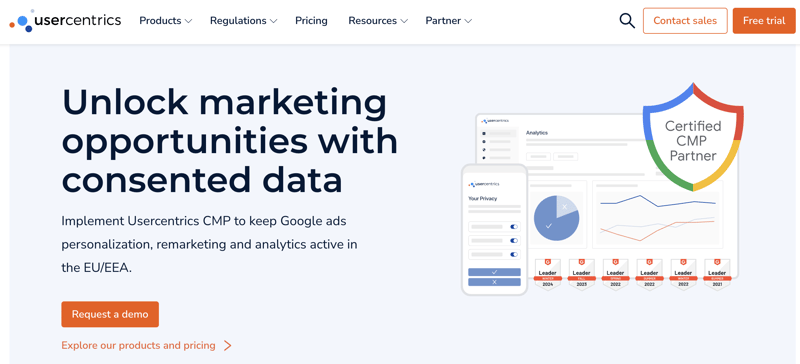
Usercentrics builds consent management solutions to help businesses collect, manage, and document user consent. The platform facilitates compliance with global privacy regulations while boosting consent rates and cultivating trust with customers.
Usercentrics was founded in 2017 as a way for companies to manage the rise of new privacy mandates, such as GDPR. It is a known entity in compliance, particularly for companies interested in better cookie consent management.
Top Features
Usercentrics specializes in consent management and offers a variety of tools to facilitate this goal. As an enterprise-level privacy platform, Usercentrics has dedicated tools that obtain, manage, and document user consent, and it leverages tools for consent storage and consent APIs.
The company offers privacy compliance audits for businesses unsure of their posture as well as dynamic policy generators for privacy documents.
Pros and Cons
Usercentrics Pros:
- Strong automated feature that streamlines processes
- Helpful customer support
- Extensive resource library and documentation
Usercentrics Cons:
- Complex setup and onboarding processes
- Confusing UI
- Substantial work required to operationalize system
Suitability
Usercentrics’ features are suitable for businesses of all sizes. It offers tiered plans across Starter, Advanced, and Premium. The basic plans begin at just $50/month, which appeals to smaller companies. However, buyers should ensure they’re prepared for the process before committing. Users report substantial difficulty getting the most out of Usercentrics, with high frustration levels across onboarding and usage.
Overall Thoughts
Usercentrics is a quality platform with many great features for consent management. Its tiered pricing system offers some flexibility for businesses, although any buyer should be prepared to invest significant time to onboard and integrate the software.
7. Resolver
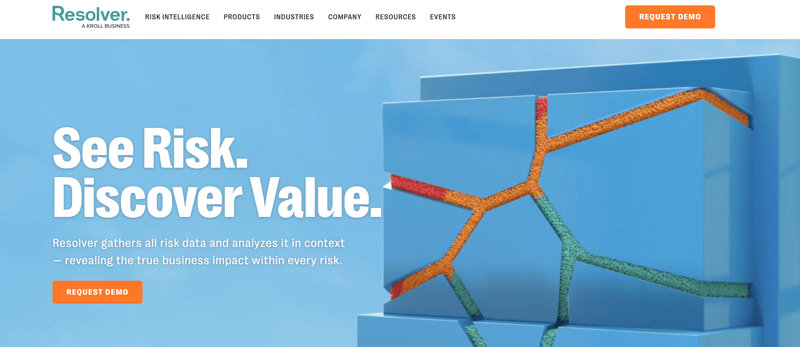
Resolver provides a range of data and reputation protection services from its cloud platform. The compliance module of the platform works together with risk and auditing services to create a full GRC package.
The compliance system is centrally managed by the Resolver team. The platform gets updated whenever a standard changes and all subscribers are instantly notified. Users also get notifications when new regulations come into effect.
The Resolver platform is designed to meet US regulations – specifically California PII laws and financial reporting standards.
Top Features
The Risk and Audit module of the Resolver platform has both internal and third-party risk assessment services. The package lays down a checklist of risks to investigate and creates a workflow of tasks that need to be implemented. The service provides a framework that allocates tasks to team members and tracks the progress of each requirement.
The system also provides an Internal Audit Management unit that sets out the requirements for compliance, Running an audit reveals the systems that need to be tightened in order to gain compliance. Audit completeness is ensured through a library of templates. It can be expected that a business’s compliance team won’t know all of the requirements of a specific standard. The template provides a checklist of services and assets to check.
Pros and Cons
Resolver Pros:
- Compliance with CCPA/CPRA
- Reputation monitoring that scans social media
- Constantly updated for regulation changes
Resolver Cons
- Provides more compliance measures for financial reporting standards
- Doesn’t implement GDPR
- The framework enforces standards but is inflexible
Suitability
Resolver is not the best option for international businesses that deal with members of the public in multiple countries. The platform is only able to implement California PII protection measures and, although all of the other state standards in force within the USA are very similar, the Resolver system doesn’t enforce compliance with any of them.
The Resolver system has some interesting services that extend beyond data protection. For example, the platform can scan social media to look for critical posts that damage the business’s reputation. There are also brand protection measures available. There is even an Athlete and VIP Wellbeing module. So, Resolver is a good choice for a large company that works in the entertainment or sporting field in California.
Overall Thoughts
Resolver is a strong corporate data protection system with particular emphasis on ensuring that a company meets its financial reporting requirements and that the business doesn’t lose value due to smear campaigns or oafish public relations mistakes. The Resolver platform is not so strong at PII protection and shouldn’t be the first choice for eCommerce enterprises.
8. Security Scorecard
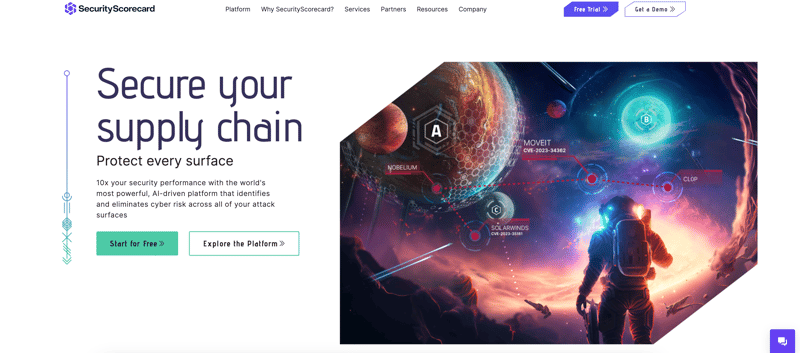
SecurityScorecard is a risk assessment platform that includes a vulnerability scanner. The service checks your system from an external location. This is called an attack surface assessment and it looks for the typical methods that hackers use to get into a network or capture a user account.
This service stores the scores of all of the businesses that it assesses. This is needed for the second part of the risk assessment process with deals with third parties. The service scans your system and identifies vendors, such as software suppliers or cloud platforms. In many cases, SecurityScorecard already has an assessment on file, so you can complete your risk audit quickly.
If a supplier isn’t already in the SecurityScorecard database, the tool generates a questionnaire for you to send to your suppliers.
Top Features
SecurityScorecard doesn’t just check on your suppliers, it also looks at the suppliers of your suppliers to build up a supply chain risk profile. The system gives each business a rating from A to F. On this scale, A is the best score possible and F is bad. This package focuses on supply-chain risk assessment. It gives your business a score, which boils down to a grade from A (good) down to F (terrible).
Factors that contribute to a company’s score include a Dark Web scan that looks for data breaches that have already occurred.
The service looks at factors such as external attack surface, patching status, endpoint configurations, and Dark Web chatter.
The company looks across the Dark Web for IP addresses, email addresses, and account credentials for a company.
Pros and Cons
Security Scorecard Pros:
- A bespoke list of vulnerabilities
- Easy-to-understand grades
- Dark Web scanning
Security Scorecard Cons:
- Doesn’t provide compliance reporting
- No sensitive data discovery
- A bad score can lose you business
Suitability
This service can get you into trouble because your score is accessible to all. One good aspect of the system is that it motivates you to hurry up and get your system secure so that you gain a better score. If you keep a bad score, others will be able to see it and you might get your contracts canceled.
The public nature of a SecurityScorecard grade might put off a lot of businesses. However, if one of your clients signs up for the service, you could lose that customer if you are not prepared.
Overall Thoughts
SecurityScorecard has an extensive database of vulnerabilities that its external attack surface scanner looks for. This includes the OWASP Top 10 and also has more.
The idea of being caught out and given a low grade might put you off. However, if you haven’t already aced the scoring system by the time your clients sign up for SecurityScorecard, you will lose business. So, it might be a good idea to get ahead of the pack.
9. Securiti.AI
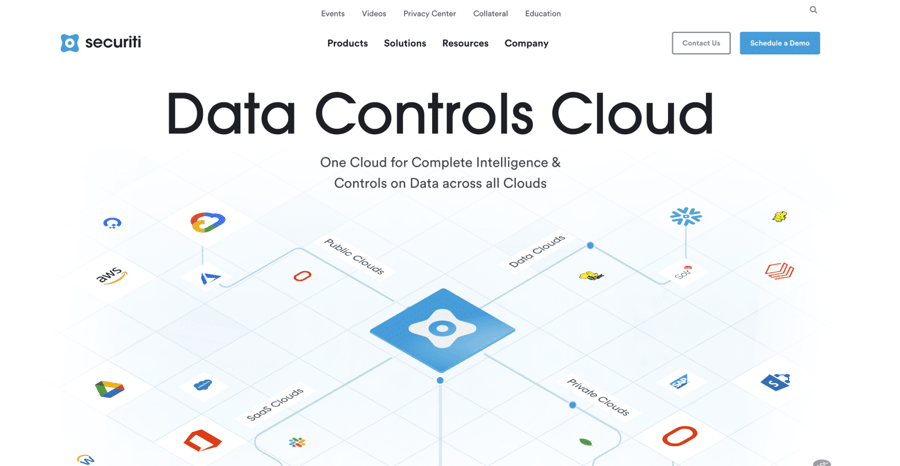
Securiti.Ai is a SaaS platform that ticks all of the boxes for a risk assessment and compliance enforcement service. This package provides an eDiscovery routine with a classification and data mapping system. The data scanner doesn’t just look through files; it also searches through databases for sensitive data. The platform has integrations that enable it to interface with Oracle, Apache Hadoop, MongoDB, and Google BigQuery.
The data protection mechanism in the package relies on the user authentication process of the applications that you use. This would include the cloud drive systems. Security.Ai only deals with cloud-stored data.
Top Features
This tool provides a data scanner and activity logging service for cloud-held data. The sensitive data classifier in the platform scours files and databases, producing a list of locations of PII. This is an essential feature for compliance management.
The Securiti.Ai system enforces data security standards from Australia, Brazil, Canada, China, the European Union, Ghana, Hong Kong, India, Indonesia, Israel, Japan, Kenya, Kuwait, Malaysia, New Zealand, Nigeria, Oman, Panama, the Philippines, Qatar, Saudi Arabia, Singapore, South Africa, South Korea, Sri Lanka, Switzerland, Turkey, Russia, the United Arab Emirates, the UK, Uganda, Vietnam, Zambia, and Zimbabwe.
Pros and Cons
Pros of Securiti.Ai
- Covers a long list of PII protection standards
- Searches files, shadow copies, and databases
- Access logs
Cons of Securiti.Ai
- Only manages data on the cloud
- Relies on data-accessing and managing applications to provide user authentication
- No price list or plan outlines
Suitability
Securiti.Ai focuses on protecting data held on cloud platforms. It relies on the security procedures of cloud-based applications for data protection. The package is able to discover sensitive data and record where it is. However, the platform isn’t able to scan on-premises servers or monitor the software that you host on your own servers. So, companies that only use SaaS packages and cloud data stores would benefit from this system.
Overall Thoughts
The Securiti.Ai has all of the features that you need for data discovery and protection. It is able to enforce compliance with a long list of data protection standards, which makes it ideal for enterprises that operate internationally on the Web.
The platform also includes workflows and templates for accepting, processing, and delivering responses to Data Subject Access Requests (DSARs). Modules are available on the Securiti.Ai platform for third-party risk assessment and there are consent and policy notice templates available plus consent and cookie consent banners for websites.
Benefits of Compliance Software
The main incentive to installing compliance software comes from legal requirements. However, those data protection standards to which you might be forced to comply actually help you by providing a road map to data security. Many businesses just wouldn’t know where to start when ensuring data protection, so a set of guidelines cuts out a big project researching what to do.
Compliance software saves you the cost of hiring a lawyer or bringing in a consultancy to tell you how to implement data protection systems. These packages provide an off-the-shelf solution and prevent your company from suffering reputation damage as well as keeping on the right side of the law.
What Should You Look for When Evaluating a Compliance Tool?
Every software has its pros and cons, but these are the main factors we took into consideration before settling on this list:
👉 Features: It goes without saying that the best compliance software should include forward-thinking features that keep users protected, even when they're unsure of all the regulatory guidelines to comply with. The tool should essentially act as a partner, helping folks navigate through the compliance concerns.
👉 Customization: The best software can modify its feature set to include custom workflows per its audience's needs. That was a key consideration when evaluating software.
👉 Customer Support: Compliance can be perplexing and confusing, so robust customer support is critical for tools that want to stand out from the rest.
👉 Built-In Dashboards and Notifications: We prefer software that can give you a 360-degree view of your data and notify you when something's amiss.
👉 Flexible Pricing Options: In this constrained budgetary environment, it's nice to have tools that offer monthly contracts, free trials, and flexible payment terms that can help with cashflow.
What Different Types of Compliance Can These Tools Cover?
Compliance means different things to different people.
- Banking compliance for 'Know-Your-Customer' and Anti-Money Laundering capabilities. This type of compliance is strictly only for financial institutions to guard against illicit sources of income, such as drug trafficking.
- Regulatory compliance to meet requirements for data privacy laws, including data breach notifications, consent management, personal data collection, restrictions against data transfers, and more. Some regulatory compliance software can also extend into areas like cybersecurity threat management, incident response, SOC2, and more.
- Safety and security compliance, for companies operating in oil and gas, petrochemicals, and energy generation industries. Here the onus is to keep workers safe and protected while doing their jobs.
- AI compliance — this is a rapidly emerging field since regulations are now starting to take effect. Essentially, this will impact AI governance and the training of LLMs.
Learn how Enzuzo can help meet your compliance needs. Book a complimentary strategy call (no obligation or purchase necessary)👇

Osman Husain
Osman is the content lead at Enzuzo. He has a background in data privacy management via a two-year role at ExpressVPN and extensive freelance work with cybersecurity and blockchain companies. Osman also holds an MBA from the Toronto Metropolitan University.
